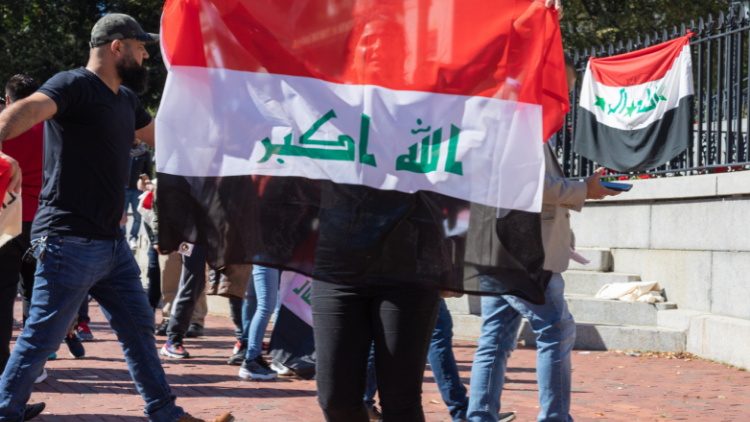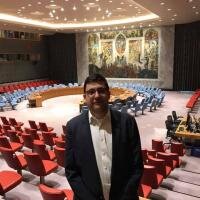MENAPOL Blog
The Dwindling Shadow of Iran - PART II

Part I of this article studied the geopolitical similarities between Iraq and Lebanon. Part II will overview the recent political developments in Iraq, in an effort to construct a possible general framework of Lebanon’s short-term future, testing the previously discussed idea that Iraq’s present is Lebanon’s future.
Recent Geopolitical Development in Iraq
Under the Obama administration, the United States was more interested in advancing a nuclear deal with Iran, rather than pushing it out of Iraq and containing its regional expansion. Indeed, the US failed to support the more Arab leaning Ayad Alawi, who won a plurality of votes, allowing Mr. Nouri Al Maliki, a pro-Iranian Iraqi politician, to be reelected Prime Minister in 2010. Once in power, Al Maliki overreached politically and economically, isolating the Sunnis, exacerbating sectarian tensions, and letting corruption run rampant. This pushed Iraq further away from the rest of the Sunni Arab countries, culminating with the Syrian civil war and the rise of Daesh (Islamic State of Iraq and Syria), and the creation of the Hashd Shaabi (Popular Mobilization Forces). The fight against ISIS, and the resulting sectarian tensions, amid reports of atrocities by the group against Shia, and counter atrocities by the Hashd Shaabi on the Sunnis, increased Iraq’s estrangement from the Arab world.
The deteriorating economic situation, the non-existent public services, widespread unemployment, and endemic corruption ignited a large wave of protests that rocked the Shia heartland in late 2019. These protests were faced by a vicious crackdown by Abdul Mahdi ’s government, intensifying the protests and preparing the ground for a change in government.
Under President Trump’s administration, the US started actively working to create an anti-Iranian coalition, peeling political parties away from the pro-Iranian side, with the help of Saudi Arabia, and several key figures like Moqtada Sadr. The US also pushed to ease the political and security pressures on the Sunni, ameliorating their economic situation, directing more aids to their communities, and getting them more involved in the political process to strengthen the anti-Iran coalition. The result: Iraq did not return to a semblance of stability until the different sectarian groups, especially Sunnis, became more represented and started receiving a fairer share of power, appointments, and state revenues.
Then, Iraq’s situation started to improve with the election of a new Prime Minister, a Shiite politician with Arab tendencies and anti-Iranian inclinations. Its clear that since PM. Mustafa Al-Kadhimi took power, he has worked steadily on moving the country away from Iranian control, even coming to blows several times with the Hashed Shaabi, trying to curtail their influence and military power.
PM Kadhimi also utilized western and Arab aid to ameliorate the economic situation of Iraq and started restoring basic services and social services in poorer areas. Kadhimi also started confronting and limiting the militias and their corruption, and control of State institutions, using U.S.-trained Iraqi Counter Terrorism Force, for example. The PM even visited the US, in August 2020, which portrayed the changing geopolitical balance in Iraq!
Slowly, an anti-Iranian wave started spreading among part of Iraq’s Shia, supplementing a large portion of the Sunnis who already feel at odds with Iran. This trend started trying to turn Iraq towards what these Iraqis see as a brighter future, with greater relations with the Arab and the West. This push also extended to economic affairs, such as the efforts to end Iraq’s dependency on Iranian electricity by replacing it with Saudi sources, signing agreements with five US energy firms worth $ 8 billion.
The upcoming parliamentary elections in October, will be a real test for this process, and whether it continues or it is reversed. Especially, with the election of
President Biden, and the possibility that a new Iran nuclear deal could take precedence, over all other issues.
What about Lebanon?
The political developments in Iraq could be used as blueprint to get Lebanon out of the political and economic deadlock crushing it. First, the only way forward is via the re-engagement of the Sunni Arab states and the US. They must guide and support efforts to create and strengthen an anti-Iran coalition, encouraging different political parties to unite and fight the influence of Iran and Hezbollah. These efforts should be in coordination with the new forces and groups that have risen to the surface, following the protests that started in October 2019.
Second, it is crucial to peel off forces that are currently allied with Iran, just like Moqtada Sader in Iraq, and move them towards a more Arab leaning position. These efforts should be coupled with an anti-corruption drive, and an economic aid plan that will allow the population to feel the difference and the improvement to their lives, which requires a steady injection of funds from the gulf and the US.
However, it is important to watch out for the same pitfalls that are hindering these efforts in Iraq. Indeed, Iraq is witnessing assassinations of anti-Iranian public figures, especially security officers and political activists. In parallel, large insurrectionists and military attacks orchestrated by pro-Iranian militias targeting State institutions, and western embassies have been increasing in frequency , to destabilize the country and push the US and the West to disengage. Pro-Iranian forces have also been using popular discontent and economic grievances to incite more social upheavals to splinter the current coalition and return to the previous status quo.
Additionally, it is doubtful that Iran will stand by idly. Most likely it will push its militias and allied political forces to claw back influence and derail the fragile path forward. Especially, when we consider Iranian’s strategic imperatives of weakening and stopping the rebuilding of state institutions in Iraq, Lebanon, and other countries. According to Brookings “Iran has excelled at executing a form of one-state, two-systems formula for conflict-ridden countries in the region. The Iraqi [and even the Lebanese state] is deliberately kept weak; Tehran does not seek to rebuild institution, [it] opts for an approach centered around a host of armed non-state actors. It establishes networks and institutions that parallel national institutions.” In other words, if Lebanon is left to its own devices, Iran will continue implementing its strategy of dismantling the state, and the world will end up with another failed state in the Middle East.
Finally, Lebanon has several unique characteristics that might alter this framework. Most of Lebanese Shias are firmly united behind Hezbollah, and although the current economic situation has led to some fissures, there is a lot to be done to peel a significant portion of them away from Iran. Additionally, there are few alternative Shiite politicians around which such an effort might coalesce. Meanwhile, Lebanon has no oil, and the KSA, is too disinterested to reenter the Lebanese political arena. But the same could have been said of Iraq two years ago, and the KSA and the Gulf countries changed their minds and are now actively helping.
In keeping the parallelism with Iraq, the next Lebanese parliamentary elections in 2022 will be critical! The elections will show if it is possible to create a viable anti-Iran coalition that could win a majority and move Lebanon forward!
Final Thoughts
The first draft of this article was written just before the assassination of the Lebanese influential activist and researcher Loqman Slim. As discussed, this follows the Iraqi chain of events, in another macabre indication of how similar the developments in the two countries are. Indeed, last July Hisham al-Hashimi, a prominent researcher and proponent of government efforts to rein in the Islamic State and Iraq’s Shiite militias, was killed in Baghdad.
Meanwhile, the recent assassination of another Iraqi activist and member of October demonstrations coordination group, Ehab al-Wazni in the Karbala region, bodes ill for the short-term future of Lebanon and Iraq. Such assassinations could indicate a concentrate countereffort to stem any possible solution that might push Lebanon and Iraq out of the shadow of Iranian influence, hinting at the possibility of more political assassination in the near future...

